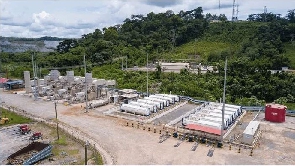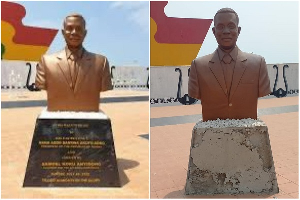The Parliamentary Select Committee on Mines and Energy has found no evidence of any losses from a deal between the Ghana National Petroleum Corporation (GNPC) and Genser Energy Ghana Limited (GEGL), concluding an investigation into unfounded claims of irregularities.
The investigation was initiated in response to claims made by the African Centre for Energy Policy (ACEP) and the IMANI Center for Policy and Education in July 2022, alleging incorrectly that the deal incurred a loss of US$1.5billion for the nation. The committee’s report instead found benefits for Ghana far exceeding that sum.
If it were about maths and not politics, the report would settle the matter.
But the Ranking Member of the Mines and Energy Committee, John Abdulai Jinapor, has expressed his disagreement with the committee’s findings. He still believes the Gas Sales Agreement (GSA) between GNPC and Genser Energy will lead to significant losses for the state.
The ACEP and IMANI reports raised concerns over a Gas Sales Agreement (GSA) between GNPC and Genser Energy Ghana Limited (GEGL), asserting that Ghana stood to lose the “whopping and galactic sum of US$1.5billion” due to this arrangement.
The allegations raised by ACEP and IMANI claimed GNPC sold gas to Genser at significantly reduced rates compared to its purchase price, resulting in a perceived subsidyFollowing an 11-month-long investigation, the Parliamentary Committee has refuted the claims made by ACEP and IMANI, stating that the GSA is not a “sweetheart contract”.
The committee found the computation methods used by ACEP and IMANI faulty. The CSOs calculated a hypothetical loss based on the contractual sum of US$2.79/MMBtu. But that price reflects offsets from a capacity charge of US$3.29/MMBtu.
The committee found the arrangement much to the nation’s benefit, presenting 11 key economic advantages associated with the deal, ranging from energy security to job creation, development of future industries, and foreign direct investment.
All promoting economic growth for Ghana and Ghanaians.
Mr. Jinapor does not seem to agree with these benefits to the nation. But the Ranking Member has yet to present alternative math calculations to substantiate his point specifically.
Key findings from the report:
1. Make savings to the tune of US$1462billion as GNPC will lose US$1.462billion if GEGL moved to WACoG Net Back
2. GNPC/GEGL Gas Transmission Agreement’s savings to GNPC is US$1.462billion. If Ghana had borrowed, it would have cost US$1.625billion.
3. Reduction in transmission losses by US$480millions once Ameri plant is relocated to Kumasi and made operational
4. Export of NGLs using Takoradi Port would increase port revenue from cargo fees, port dues and other services.
5. 15m tonnes of carbon dioxide reduction per year as the UP01 and PP03 will reduce flaring and bring all flared gas to onshore for processing and utilisation as well as 0.225m tonnes of power generation in Kumasi, saving about 40MW of transmission loss.
6. 75 percent fuel cost reduction by substituting CNG for diesel for industry by 75 percent
7. GEGL clients have extended the life of their mines by 10 years since engaging GEGL due to reliable and quality power
8. Structuring of GEGL pipeline network around future industries would enable these industries to develop quickly.
9. Over US$400m export revenue from NGL/LNG processing and export per year
10. Over US$980m direct investment in Ghana with same amount of forex invested
11. About 250 direct and 950 indirect jobs to be created from the business of GEGL
Business News of Tuesday, 22 August 2023
Source: thebftonline.com

















